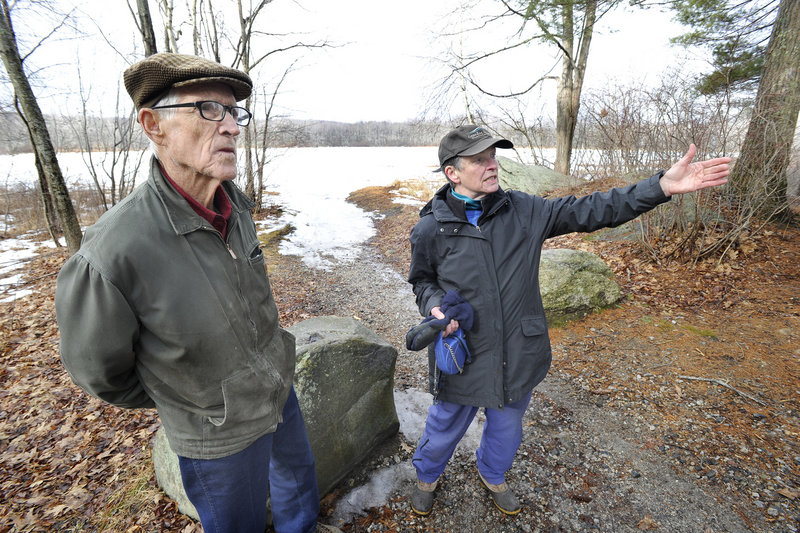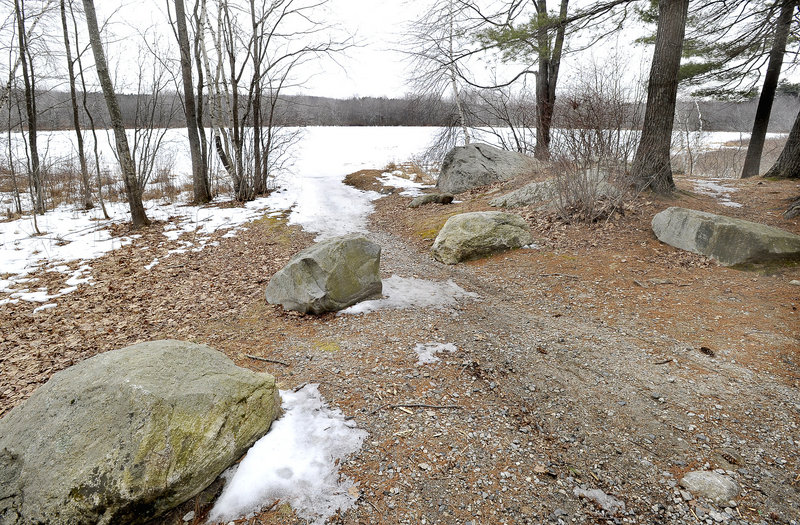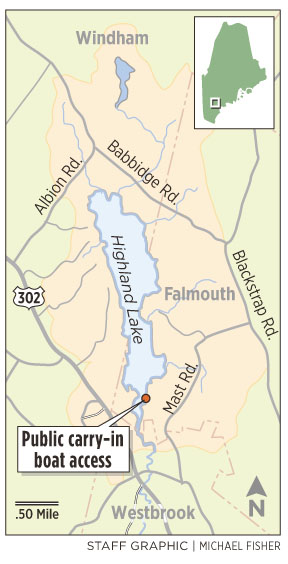FALMOUTH — Town councilors are poised to reject a state proposal to expand the only public boat access to Highland Lake, encouraged by property owners who say that making way for bigger boats could infect the lake with choking weeds and bring other problems.
If the town blocks improvements to the carry-in access, the Maine Department of Inland Fisheries and Wildlife has promised to stop stocking one of the largest lakes in southern Maine with salmon and trout, a yearly practice that dates back to the 1930s.
Fisheries officials say they’re trying to follow department policies that ensure anglers’ access to fish-stocked waterways, in the face of strong opposition from property owners who want to limit public access to the lake.
The department’s threat rings hollow for many Highland Lake Association members, whose education and conservation efforts helped to remove the lake from the state’s impaired-waters list in 2010. The lake is now clean enough to support aquatic life, and association members say they’ve seen plenty of bass, perch and pickerel to prove it.
“Our biggest concern is the health of the lake,” said Julie Motherwell, who has lived near the boat access on Lowell Farm Road since the 1970s. “Just one season of unsupervised use by big motor boats on trailers could do great damage.”
If public access is improved, lakeside residents worry that larger boats will bring the invasive and costly-to-remove Eurasian water milfoil, along with increased pollution, trash, crime and partying, which have plagued boat launches in other communities.
The controversy pits property owners’ concerns against the goals of inland fisheries officials as they try to preserve and enhance public access to a public resource that’s rimmed by more than 250 property owners.
Lakeside residents say it’s not about keeping the lake for themselves. They say plenty of people use the public boat access as it is: a narrow dirt road that leads to a 10-space dirt parking lot where users can carry canoes, kayaks and other light boats to the water’s wooded edge. Motherwell said more than a dozen ice fishermen and snowmobilers were parked there one recent afternoon.
“It’s not NIMBY,” Motherwell said, using a common acronym that stands for “not in my backyard.”
But inland fisheries officials and others say anti-public-use sentiment is fueling opposition to expanding and paving the boat access, which is located near the southern end of the lake and is owned by the Maine Department of Conservation.
Many people who live on or near the lake belong to neighborhood associations that have private boat launches. In recent decades, sprawling year-round homes have cropped up next to modest summer cottages, in part because the lake is close to Portland.
Many residents have large motor boats, and some people don’t want to see more, according to Francis Brautigam, a state inland fisheries biologist.
“People on the lake are not that inviting,” Brautigam said, choosing his words carefully. “There’s a change in the value system throughout southern Maine. People buy their piece of waterfront and they don’t really want to share it. But when you buy property on a public resource, you buy into the idea that the public is going to use that resource.”
IN FAVOR OF MORE FISHING
Ralph Johnston, who lives on the Windham half of the lake, said he agrees with Brautigam.
A well-known steward of the lake, Johnston started monitoring its water quality in the 1970s. He wants the lake to stay healthy, too, even though he’s not a fisherman.
Johnston said he’s the lone Highland Lake Association member who wants to increase public access, in part because about $3 million in public money has been used to fund erosion-control projects and to fix the dam that maintains the lake’s water level.
He respectfully challenges the concerns of Motherwell and other association members.
“I think they should allow people to go on the lake for whatever reason they want,” Johnston said. “I don’t envision a whole lot of boat traffic coming. More fishermen might come, but they’re pretty good about keeping the invasive plants out because they don’t want the lakes to be damaged, either.”
State fisheries officials started planning to expand the public boat access after state Rep. Stephen Wood, R-Sabattus, questioned why the lake was still being stocked with fish when it didn’t have “equitable” public access. Wood is a member of the Legislature’s fisheries committee who also represents Greene, where the state stopped stocking Allen Pond several years ago because it didn’t have equitable public access.
According to Brautigam, equitable public access means members of the public are able to launch boats that are the same size and type used by people who live on the lake.
Improving access would increase public use as much as 5 percent, based on past efforts to improve access, he said.
Stocking of public waters is linked to public access because the stocking program is funded by state fishing license fees, Brautigam said.
Highland Lake is stocked annually with 500 fall yearling brown trout, 150 fall yearling landlocked Atlantic salmon and 30 adult landlocked Atlantic salmon.
Highland Lake residents could apply for a state permit to stock the lake on their own with salmon and trout raised by hatcheries, Brautigam said, but getting a permit would require them to improve public boat access.
Most Highland Lake residents aren’t concerned that the state will stop stocking fish, according to Teresa Pierce, chairwoman of the Falmouth Town Council.
RESIDENTS OPPOSE EXPANSION
The council held a public hearing last week on the issue. Testimony from 15 Falmouth and Windham residents overwhelmingly opposed expanding the public boat access, Pierce said.
Councilors also were united in their opposition, including Tony Payne, who questioned why inland fisheries officials are so concerned about “the size of people’s toys.” The council is expected to vote against expanding access on Feb. 27.
“There wasn’t a compelling reason to expand the launch and it’s a risky prospect to open it up to more use,” Pierce said. “We have a beautiful lake and a lot of people enjoy it the way it is. There are diverse opportunities (elsewhere) in southern Maine for other types of boating uses.”
If the council rejects the expansion proposal, inland fisheries officials will have to rethink their plans.
“We’ll have to make a determination whether we move forward on a contentious project or not,” Brautigam said. “The last thing we want to do is eliminate stocking opportunities.”
Staff Writer Kelley Bouchard can be contacted at 791-6328 or at:
kbouchard@pressherald.com
Copy the Story Link
Send questions/comments to the editors.





Success. Please wait for the page to reload. If the page does not reload within 5 seconds, please refresh the page.
Enter your email and password to access comments.
Hi, to comment on stories you must . This profile is in addition to your subscription and website login.
Already have a commenting profile? .
Invalid username/password.
Please check your email to confirm and complete your registration.
Only subscribers are eligible to post comments. Please subscribe or login first for digital access. Here’s why.
Use the form below to reset your password. When you've submitted your account email, we will send an email with a reset code.